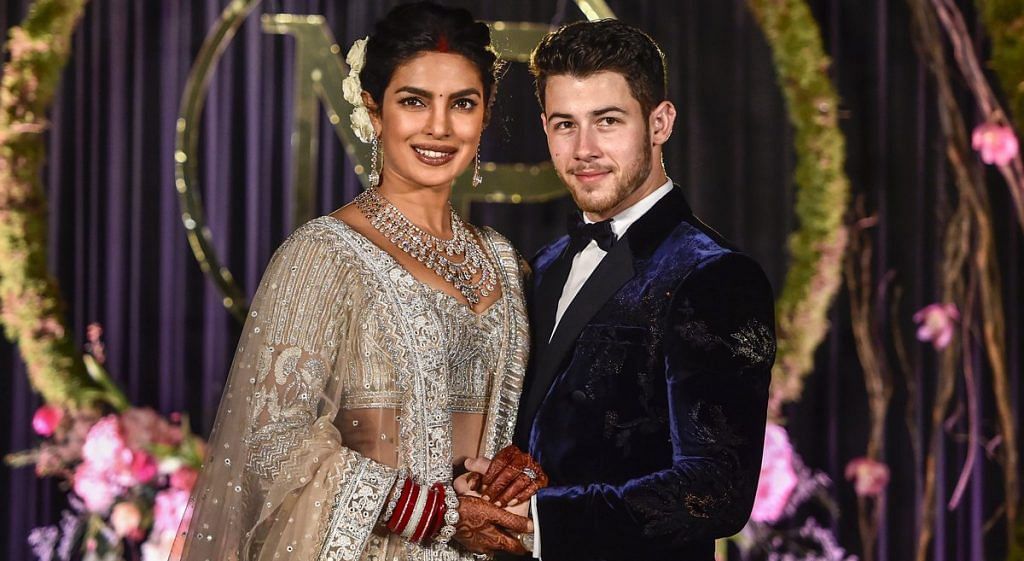There’s something very unsettling about seeing Priyanka Chopra talk about choice and agency while wearing sindoor and choodas.
Priyanka Chopra and Nick Jonas’ extravagant Jodhpur wedding has been the talk of the town all week. The global diva is already out there talking about tech investments and women empowerment in TV interviews, without wasting any time. But there’s just something very unsettling about watching Priyanka Chopra talk about choice, agency and rights for Indian women, while wearing thick red sindoor (vermillion) and choodas (sacred Hindu bangles).
“Don’t focus your energy so much on what people think of you, or what society says. Focus more on what your loved ones think of you. If we lived more in reality, life is really fairly simple”: @priyankachopra‘s advice on love.
Watch now on https://t.co/hMlRpgrUU6 and NDTV 24×7 pic.twitter.com/i3sbshsMNx
— NDTV (@ndtv) December 5, 2018
These accessories have heavy religious connotations, and through time have become important check-marks for Indian uncles and aunties in their sanskari bahu requirement list. But the modern Indian woman isn’t about that life. And who else but Piggy Chops, the cosmopolitan, Hollywood-transitioned, go-getter icon, to better understand the Indian woman’s hard fight against archaic norms.
Also read: Nick Jonas lucked out with Priyanka Chopra — not the other way around
Before I am labelled an extremely prickly Left-liberal, we should have a quick check of our own history. Some scholars point out that according to the ancient (and much problematic) Hindu text Manu Smriti, the husband applies the vermillion mark onto the woman’s head to signify the wedlock, not only as a cheesy gesture of love but a marking of territory. The woman is a property, which needs to be protected by the man.
Cut to 2018, where sindoor-wearing Priyanka Chopra is talking about her investment in Bumble – a social networking/dating app that gives women the benefit of making the first move. She says in an interview, “As a woman from India, I think it [Bumble] would be a really amazing thing for Indian women to have in their arsenal, which gives them a sense of empowerment that is on their terms.” She further adds, “It’s such a great idea for urban India right now that is waking up to women wanting to make their own choices and having a say in our lives, which was something we never had.”
I hate to break it, but we still don’t have it, Priyanka. ‘Choice’ is a tricky tool to make someone believe that they have full agency in making the best decisions for themselves. However, the choices we make are hardly our own and is based on a diet of whatever society feeds us. The society makes us biased in our own judgments by shoving ‘sanskar’ down our throats. It takes a lifetime to unlearn our biases and the irrational customs we are told to follow.
Also read: Jallikattu, Priyanka’s wedding horses: Is PETA offending Indian culture or humanising it?
Yes, we are waking up and questioning these norms. We grill men for demanding their wives to be virgins, we scoff at aunties when they tell us that our skirts are too short (in Priyanka’s case, when meeting the prime minister) and we even walk into sacred spaces when we’re menstruating as an act of rebellion. In fact, Priyanka got back to work right after her wedding, which according to traditional Punjabi culture would be a no-no (because women shouldn’t be doing any hectic work while wearing choodas).
But at the same time, we fall back and become complicit in perpetuating patriarchy. We compromise on the ‘awakening’ by conforming to the same ideologies that suffocate us, and label it as ‘choice’. That’s worse than being naïve, that’s denial. The same privilege of ‘choice’ that Priyanka has for adorning the sindoor or the chooda is actually a compulsion for many brides in India who don’t get to say no. They don’t get the ‘choice’ to say no to sindoor, sex, pregnancy and domestic violence.
‘Choice’ is entangled heavily with the degree of privilege that the choice-maker holds. So Bumble’s algorithm might make a handful of its female users in India believe that they have choice, but let’s not kid ourselves. The day every woman can choose whether to wear sindoor, completely divorced of its patriarchal burden, is the day I’ll believe that true ‘choice’ has arrived.
